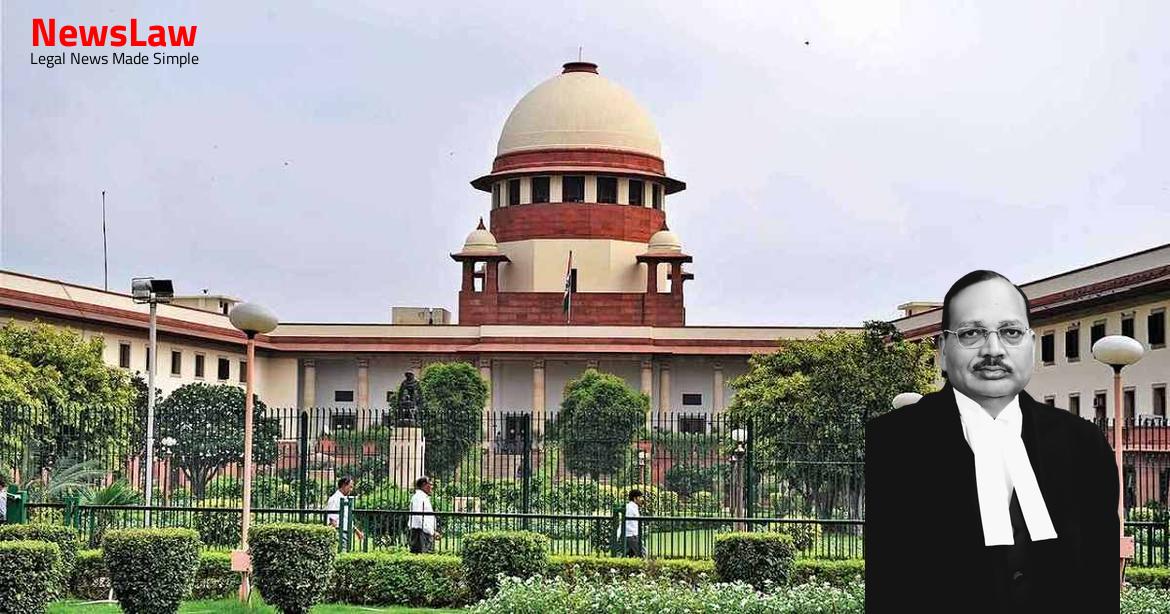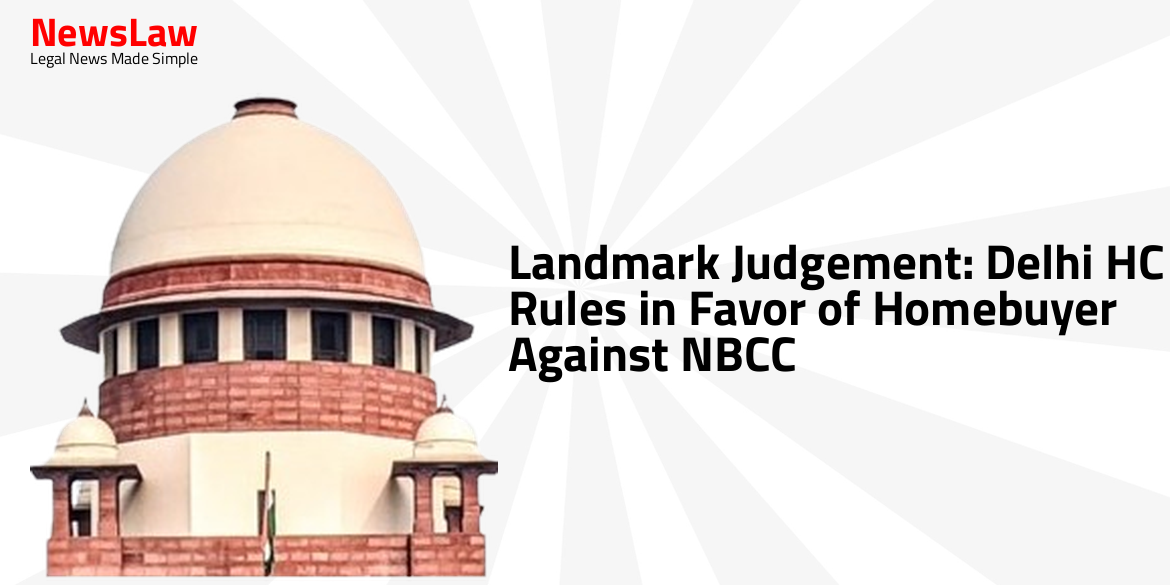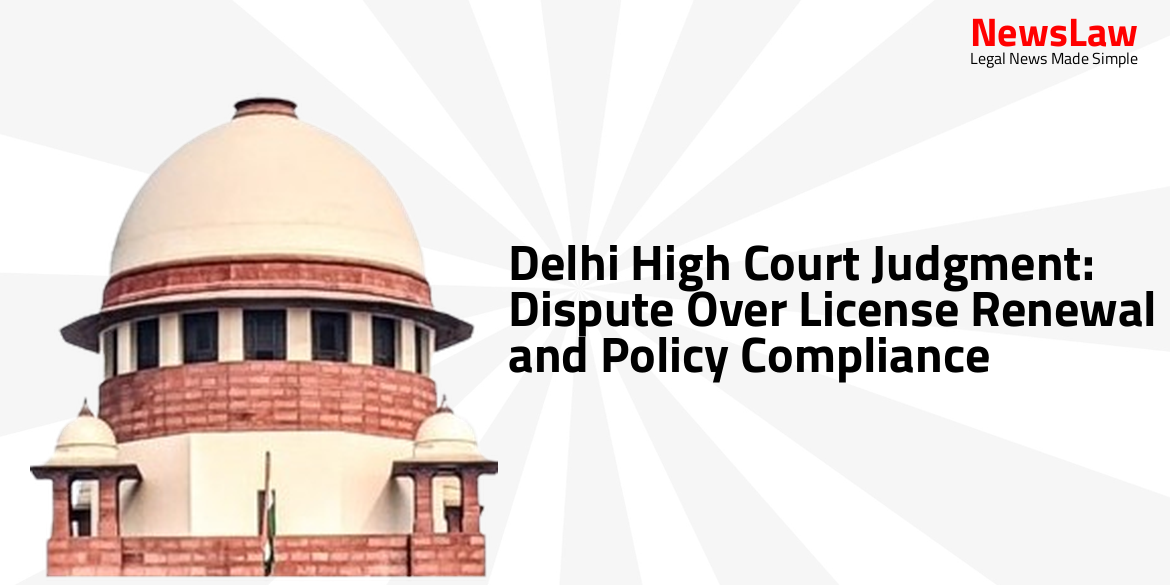Explore a recent legal case focused on the court’s meticulous legal analysis regarding judicial integrity and ethical standards. Upholding the integrity of judicial decision-making is paramount to ensure the public’s confidence in the judiciary system. This summary delves into the key aspects of the court’s evaluation of legal conduct and ethical principles in the case under discussion.
Facts
- The appellant, recruited in 1975, was posted as Additional Munsif in Dehradun.
- The reliance on compromise deeds was deemed incomprehensible due to the statutory bar of Section 11(3) of the Land Acquisition Act, 1894.
- The escalation was considered disproportionate and against judicial propriety.
- The appellant submitted a detailed reply to the chargesheet and additional written arguments.
- The appellant awarded solatium and interest above the determined rate, leading to a steep escalation to Rs 720/sq yd.
- Leave has been granted for further proceedings.
- The appellant, a judicial officer, faced disciplinary action for alleged misconduct in land acquisition cases in Uttar Pradesh.
- The High Court found the appellant’s decision-making process in the land acquisition references lacking in judicial propriety and actuated by extraneous considerations.
- The charges against the appellant included illegally enhancing compensation in two separate land acquisition cases, leading to significant additional amounts awarded to claimants.
- An enquiry committee and the Administrative Committee found the appellant guilty of deliberate and shocking errors in judgment.
- The Full Court recommended the appellant’s dismissal from service, which was initiated by the State.
- The appellant challenged her dismissal before the High Court, seeking judicial review, but was ultimately unsuccessful.
- The Division Bench of the High Court noted instances where the appellant had allegedly disregarded exemplars and engaged in misconduct during her tenure as a judicial officer.
Also Read: Legal Analysis on Arbitration Petition Limitation Period
Arguments
- The appellant argued that the chargesheet did not allege the “decision-making process” to be illegal, therefore, it could not be the grounds for the appellant’s dismissal.
- It was reiterated that disciplinary action can be taken based on the conduct of a judicial officer in the discharge of their duties, regardless of the legality or correctness of their decisions.
- The appellant emphasized the limited scope of interference in domestic enquiry matters where specific factual allegations have been proven.
- The appellant’s argument of ‘reckless discharge of duties’ was refuted with detailed reasons presented in both references.
- The appellant highlighted the substantial increase in prices as the reason for the deviation from a prior judgment.
- The scope of the proceedings was sought to be restricted by referring to constitutional provisions granting exclusive control to the High Court over subordinate judges.
- The appellant’s right to be heard and present written submissions was acknowledged, and it was argued that seeking re-determination through the Court was not permissible.
- Both the enquiry committee and the Full Court found the appellant’s conduct to be reckless and arbitrary, justifying dismissal for preserving public trust in the judiciary.
- It was pleaded that judges cannot be held responsible for the end result of their decisions, rather the decision-making process is what matters.
- The basis of the inference of misconduct was claimed to have not survived, as the net compensation was effectively lower in cost to the State.
- The need for integrity, honesty, moral vigour, and fairness in high-ranking officials was emphasized.
- Judicial officers are held to a higher standard of probity.
- They are expected to be above suspicion.
- They are not considered as ordinary government servants.
Also Read: Analysis of High Courts’ Jurisdiction and Court Orders Under Article 142
Analysis
- Courts provide a civilized alternative to resolving disputes and prevent resorting to animalistic instincts.
- Judgment affirmed and compensation further enhanced.
- No witnesses or material to cast doubts on decision-making process except for two land acquisition reference orders.
- Appellant’s arguments based on settled principles of judicial immunity.
- Enquiry was roving without rational basis for selecting cases.
- Applicable rule in Agra Development Authority limited to specific cases not present in the current situation.
- Guilt, if any, should be proven based on concrete evidence.
- Interference in judicial orders should be the domain of appellate courts, not enquiry committees.
- High standards required to overturn Reference Court’s order.
- Many complainants aim to tarnish judiciary’s image for personal gain.
- Focus should be on illegal gratification or extraneous influence on judicial processes.
- Mere suspicion cannot constitute misconduct.
- Appeals to apply established principles to the case at hand.
- Charges solely based on the judgment’s compensation enhancement.
- No allegation of the process being vitiated against the appellant.
- Judicial officers’ conduct should not cast doubt on their integrity if the legal outcome is sound.
- Judges must decide cases based on facts and applicable law only.
- Scope of judicial review under Article 226 is limited.
- Dismissal of writ petitions does not necessarily validate the orders passed by subordinate authorities.
- High Courts should protect upright judicial officers from unjust attacks.
- Integrity is the hallmark of judicial discipline
- Judges must have only one standard of rectitude, honesty, and integrity
- Judges must be above suspicion and conduct themselves with high moral values
- Judges hold a high public office and must act worthy of the office they occupy
- Judges are public servants and must discharge their duties with integrity, impartiality, and honesty
- The credibility of the judicial system relies on the integrity of the Judges
- The first and foremost quality required in a Judge is integrity
- Impeccable integrity should be reflected in both the public and personal life of a Judge
- A Judge’s duty is to serve the public and deliver justice impartially and uninfluenced by any consideration
- Judicial officers should possess the sterling quality of integrity and adhere to higher standards of honesty and probity
- Judges must be persons of impeccable integrity and unimpeachable independence
- Judicial service is not ordinary government service, and Judges are not mere employees
- The end result of the case has not been touched by superior courts
- In one of the cases, the compensation only increased
- No inference can be made based on this
- No explicit mention of extraneous consideration received or unbecoming conduct by the appellant
- The finding of ‘misbehaviour’ is based on the end result being deemed shocking by the High Court
- The shock factor raised suspicion about the integrity and honesty of the appellant
- The case against the appellant falls apart as a result
Also Read: Electoral Malpractices in Mayor Election
Decision
- The judgment of the High Court is set aside
- The writ petition filed by the appellant is allowed
- The order of dismissal dated 17.01.2006 passed by Respondent No. 1 is set aside
- Appellant’s prayers for reinstatement with consequential benefits including retiral benefits are accepted
Case Title: SADHNA CHAUDHARY Vs. THE STATE OF UTTAR PRADESH (2020 INSC 292)
Case Number: C.A. No.-002077-002077 / 2020



